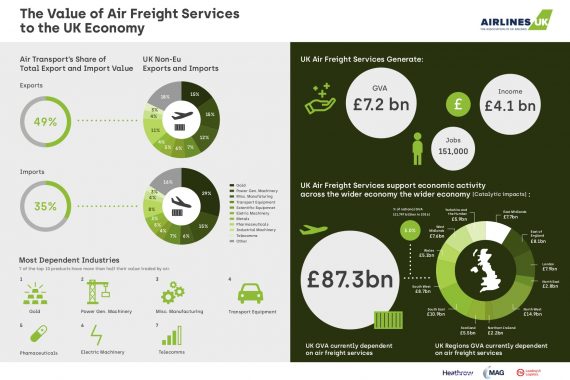Why aviation matters blog series – The importance of air cargo by Zoe McLernon, Policy Manager at Logistics UK
November 5th, 2020
Air freight is vital to the UK economy, contributing £7.2billion each year and supporting more than 151,000 jobs. The sector is extremely complex with both imports and exports that must be delivered safely, timely and economically. In this article, Zoe McLernon, Logistics UK’s Multimodal Policy Manager, explores the UK’s air freight industry and assesses its importance within the UK economy.
As well as its direct contribution, UK air freight holds importance across all sectors of the nation’s economy: £87.3 billion of UK Gross Value Added (GVA) is dependent on air freight exports annually, including £13.9 billion worth of pharmaceuticals. Salmon has become one of the UK’s most valuable food exports; in 2017, Scottish salmon exports were worth £600 million, growing year on year. And, while 91% of UK salmon is shipped internationally from Heathrow, increased connectivity at Scottish airports has provided exporters with alternative options, with salmon first exported on a direct flight from Edinburgh to Beijing in 2018.
Since the end of January 2020, hundreds of thousands of passenger flights have been cancelled in response to government travel restrictions across the globe to prevent the spread of COVID-19. With this, cargo capacity tailed off when it was needed desperately to transport vital medicines and medical equipment, such as PPE. In its place, fleets of freighter aircraft were mobilised to make up this capacity shortfall, and, thanks to the opportunities afforded by these aircraft, air cargo movements have now soared across the UK, with some airports reporting a 400% increase in cargo movements.
In my view, the COVID-19 outbreak is shining a light on the value of the logistics sector, particularly for those who rarely give our work a second thought, and provoking a re-evaluation of how much our economy relies on air cargo to keep our country moving. This can only be a positive thing for the future stability of our sector, at a time when many businesses are having to change the way they operate to move products and parts. That being said, aviation will take longer to recover than other modes and we must keep this at the forefront of our minds.
On the subject of Brexit, it is inevitable that the UK’s exit from the EU will affect the sector through changes to customs arrangements and air service agreements (ASAs). The UK currently has ASAs with the EU and other countries around the globe; differing depending on the country, the agreements recognise each other’s certification and approval processes. This is valid from the pilots that fly the planes, to the engineers and mechanics that work on the planes, right down to the fuel that keeps the planes flying. This agreement is still in place while we are in the Brexit transition period, however negotiations are still ongoing. It is vital that an ASA or comprehensive bilateral agreements are in place by 1 January 2021.
The continued growth of UK air freight is crucial to the overall UK economy and recovery for the sector is key, while considering the impact of EU Exit. Increasing international connectivity is a vital part of this; with more airports able to provide international freight flights, it will release much needed capacity at the current major freight airports. Moving forward, Logistics UK is calling on government to recognise air freight’s ongoing role in assisting with the response to the global pandemic, and ensure considerations are made for air cargo within aviation recovery plans.
Logistics UK (formerly FTA) is one of the UK’s leading business groups, representing logistics businesses which are vital to keeping the UK trading, and more than seven million people directly employed in the making, selling and moving of goods. With COVID-19, Brexit, new technology and other disruptive forces driving change in the way goods move across borders and through the supply chain, logistics has never been more important to UK plc. Logistics UK supports, shapes and stands up for safe and efficient logistics, and is the only business group which represents the whole industry, with members from the road, rail, sea and air industries, as well as the buyers of freight services such as retailers and manufacturers whose businesses depend on the efficient movement of goods. For more information about the organisation and its work, including its ground-breaking research into the impacts of COVID-19 on the whole supply chain, please visit logistics.org.uk


